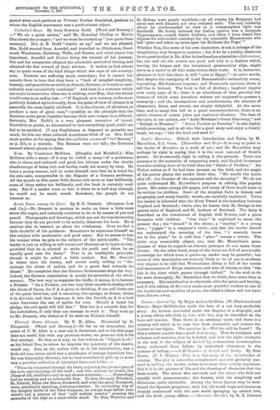Through Green Glasses. By F. M. Allen. Illustrated by M.
Fitzgerald. (Ward and Downey.)—So far as we remember, the name of F. M. Allen is a new one in literature, and as his title-page does not credit him with any previous works, we presume this is his first attempt. Be that as it may, he has written an " illigant book," as his friend Dan, to whom he imputes the paternity of the stories, would say. Dan, as the author tells us in his introduction, was a little old man whose mind was a storehouse of strange legendary lore. He was thoroughly illiterate, but he had contrived to pick np in some way a peculiar collection of historical facts and fables .—
" These he winnowed through his brain, rejecting the greater part of the corn and retaining all the chaff ; and this mixture ho would, like Asop of old, retail solemnly to any chance customer Chronology had no meaning and no terrors for Dan. To him, the early Milosiane, St. Patrick, Brian the Brave, Cromwell, and even the great Bonypart, were, practically speaking, contemporaneous. In recounting any of the doughty deeds of the First Emperor, he always kept before your mind's eye a picture of that ' ould anehint warrior' crossing the summits of the Alps on a snow-white steed. To Dan, Waterloo and St. Helena were purely mythical,—at all events, his Bonypart had never met with disaster, nor ever endured exile. The only celebrity whom he condescended to view in a commonplace light was Garibaldi. He firmly believed the Italian patriot was a renegade Tipperaryman, named Gerrit Baldwin, and often I have beard Dan express his unbounded contempt for the miserable Muneterman who had ` gone and taken up arms agen his Holiness the Pope.' " Whether Dan, like some of his own characters, is not a coinage of the imagination, may be open to question ; but if be be a reality, there can be no question that in Mr. Allen he has found an admirable collaborateur, for, one and all, the stories are good, and told in a fashion whicb, barring the brogue and the intentional grammatical slips, might serve as a model to all who make fiction their trade. It is, moreover, pleasant to find that there is still " corn in Egypt,"—in other words, that despite the contiguity of Lord Beaconsfield's melancholy ocean, boycotting, Mitchelstown inquests, and Home-rule orations, there is still fun in Ireland. The book ie full of drollery ; laughter ripples over every page of it there is an abundance of that peculiar dry humour of which some American writers are supposed to possess a monopoly ; and the incongruities and anachronisms, the mixture of characters, dates, and events, are simply delightful. At the same time, and to many this will be a great recommendation, there is an entire absence of coarse jokes and equivocal allusions. Tho best of the tales, in our opinion, are "Andy Merrigan'e Great Discovery," and "Raleigh in Munster." "From Portlaw to Paradise" ie also highly mirth-provoking, and to all who like a good story and enjoy a hearty laugh, we nay,—' Get the book and read it.'


















































 Previous page
Previous page